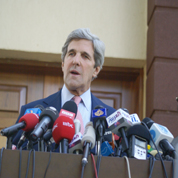AmCham expresses support for U.S. Senate's decision to grant Russia a PNTR status

Speaking on behalf of the organization last month, Andrew Somers, the AmCham president and CEO, has praised the introduction of a bill in the U.S. Senate offering PNTR to Russia. “As written, the bill will safeguard the competiveness of U.S. companies, products and services on the huge Russian market and enhance U.S. export and job growth,” Somers said. “We urge swift passage of the bill as written to ensure that U.S. companies are not sitting on the sidelines while their foreign competitors take full advantage of Russian entry into the WTO.”
The support came on the heels of an announcement by a bipartisan group of four senior U.S. Senators — Max Baucus, John Kerry, John McCain and John Thune — of a bill to establish PNTR with Russia and graduate it from the annual Jackson-Vanik certification process.
The support of AmCham, whose membership includes most, if not all, U.S. companies operating in Russia, and hence the direct beneficiaries of the projected positive changes from the PNTR status, will be something both U.S. senators and other politicians, especially in an election, where soaring unemployment figures dominate all other economic issues, will have to put into serious consideration when the bill arrives on the open floor for serious deliberations prior to voting for or against it.
“We urge swift passage of the bill as written to ensure that U.S. companies are not sitting on the sidelines while their foreign competitors take full advantage of Russian entry into the WTO.”
Somers has led regular delegations of AmCham company heads of Russian operations of American companies to Washington to meet with Members of the House and Senate to discuss WTO, PNTR and the importance of the Russian market for U.S. businesses. Over the last 12 months alone, Somers had met with over 150 Senators and Congressmen, including Senate Finance Committee chairman.
AmCham has also hosted roundtables for Congressional delegations visiting Russia in order to discuss the competitive importance of PNTR for U.S. businesses operating in Russia, the most recent being with Senator Baucus and U.S.-company heads when the Senator visited Moscow this spring, followed by a roundtable for members of staff for Senators serving on the Finance Committee. In March, the Chairman of the Board of Directors of AmCham, Ronald J. Pollett, President and CEO of GE Russia & CIS, testified before the Senate Finance Committee, urging it to endorse PNTR for Russia.
Most influential U.S. public figures that are able to see beyond the traditional anti-Russia rhetoric have always unequivocally called for an abrogation of the outdated political antiquity not so much for the benefit of Russia, though this is also very important, but to enhance and/or sustain the global competitiveness of the U.S. businesses in Russia vis-a-vis the eurozone, Japanese, Chinese and Indian companies, whose hands are not tied down by similar national legislation.
Thus, speaking at an AmCham briefing on this issue most recently in Moscow, U.S. Trade Representative Ambassador Ron Kirk noted that there is a consensus that U.S. companies operating in Russia must be discriminated against after Russia eventually seals its WTO membership at the next WTO meeting. "Once Russia becomes a WTO member, we need to make sure that U.S. businesses have the full advantages of that in Russia, and therefore it is necessary for us  to lift the Jackson-Vanik amendment."
to lift the Jackson-Vanik amendment."
The Jackson-Vanik amendment, a lingering Cold War-era vestige that has continued to irritate Moscow, hurt U.S. business aspirations in Russia and undermine bilateral trade boosting efforts, was put in place in the 1970s as a punishment against the now-defunct Soviet empire for restricting free emigration for its Jewish minority. Despite the fact that since then the Soviet Union had imploded, Russia has joined global community, including memberships in G8, G20 and other regional and international associations, the United States has, against logic and common sense, continued to adamantly hold to a discriminatory tool that has lost its relevance in the new, post-Soviet reality of today’s Russia.
Recently, some U.S. lawmakers have found another excuse for not revoking the anti-trade law, tying its withdrawal with the so-called Magnitsky list bill that condemns a roaster of influential Russian government officials implicated with the 2009 detention death of Sergei Magnitsky, a lawyer with Hermitage Foundation Capital, who had accused of Taxation and Interior Ministry employees of corruption practices.
However, Kirk said these two issues — the repeal of Jackson-Vanik amendment and human right issues in general, and the Magnitsky case in particular — should be treated as two distinct events that need not to be linked together as a single issue, noting that this position also reflects the stance of the White House on these issues. “Defending human rights and other democratic values that differentiate us as nation is something that the United States will always stand up and for, and in this regard, the Obama administration will continue its ongoing work with the lawmakers in Washington concerned about human rights and related issues in Russian,” he added. “But within the WTO perspective, our priority is for the Congress to lift Jackson-Vanik in a clean bill which deals only with the issue relevant to our ability to maintain our competitiveness on the Russian market.”












 Web design,
Web design,